In the competitive world of law, having an exceptional resume is crucial, especially for aspiring Judicial Law Clerks. Our collection of resume examples for Judicial Law Clerk positions will guide you through crafting a standout document that showcases your legal expertise, relevant experience, and unique qualities. With the right tools and insights, you can create a compelling resume that captures the attention of hiring judges and sets you on the path to success.
Judicial Law Clerk Resume Examples – Free Download
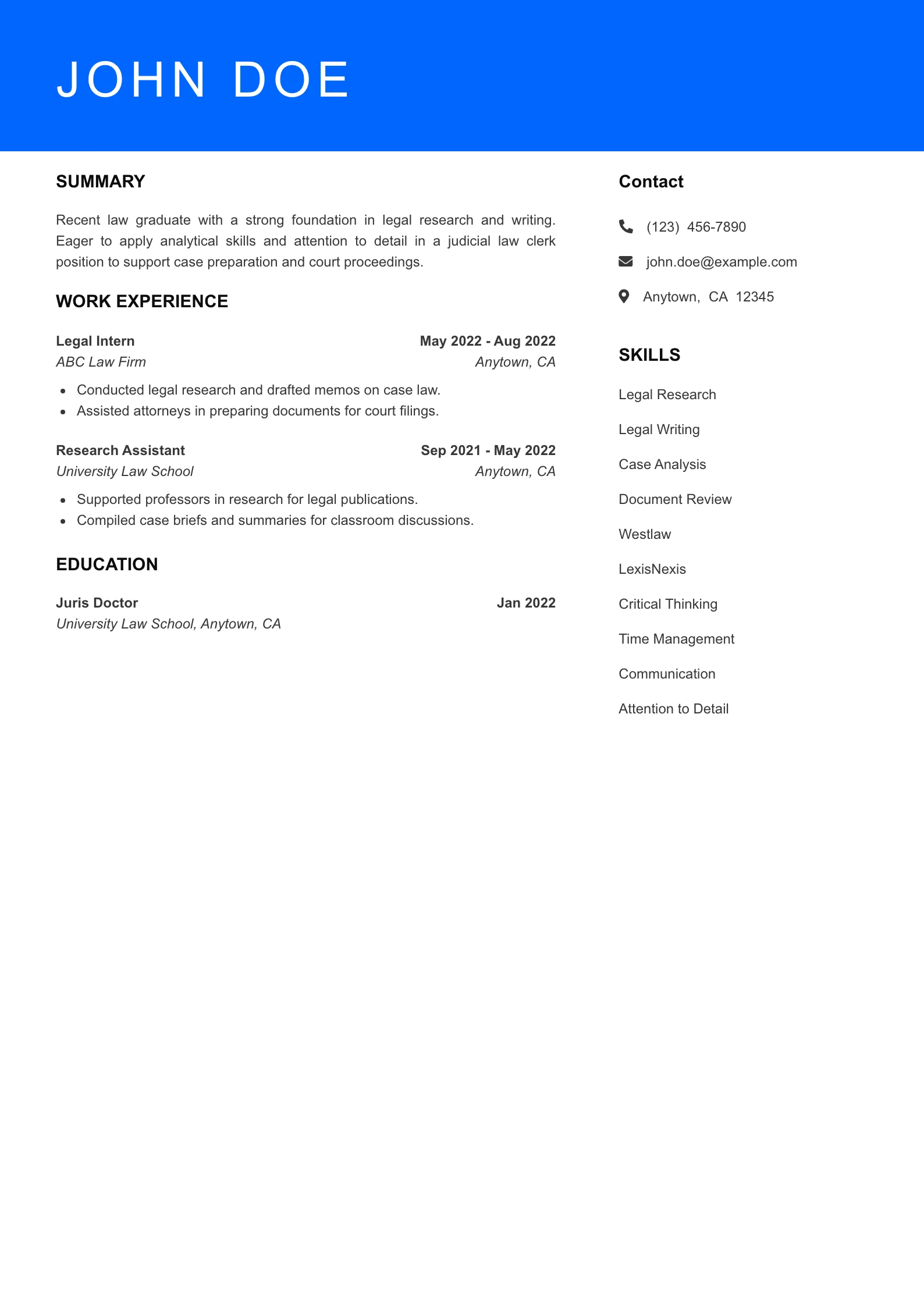

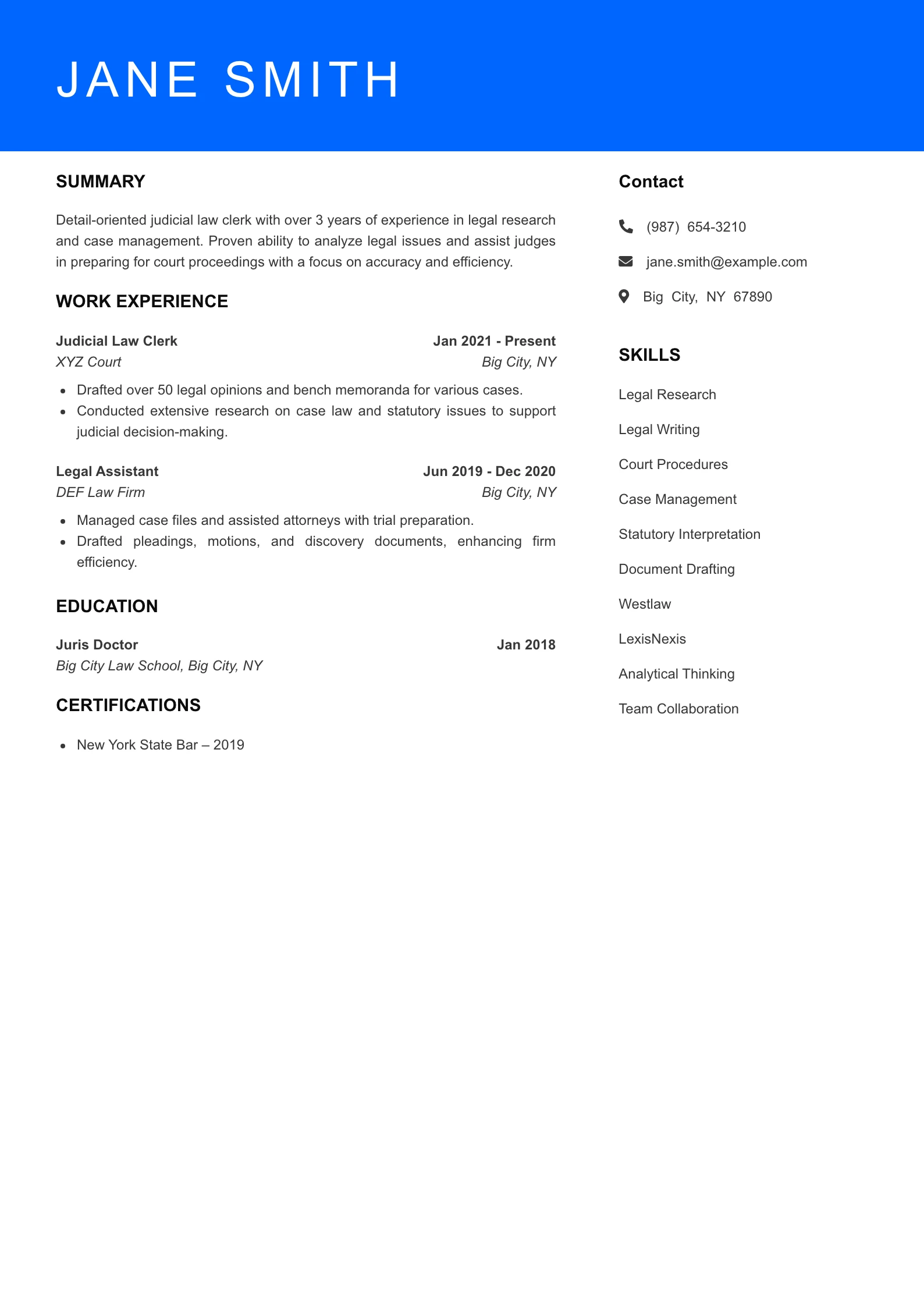
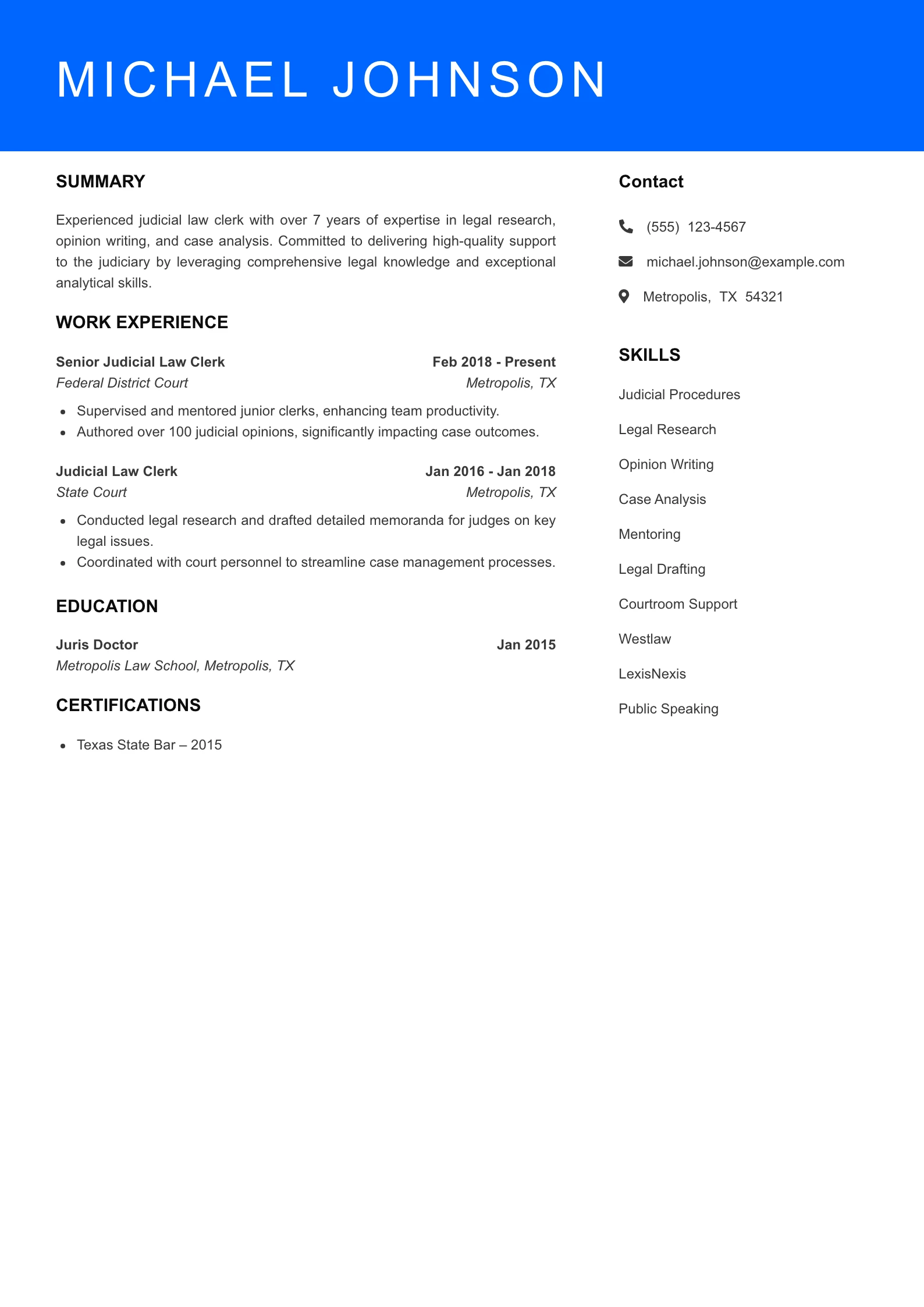
Judicial Law Clerk Resume Examples
Entry Level Judicial Law Clerk Resume Example
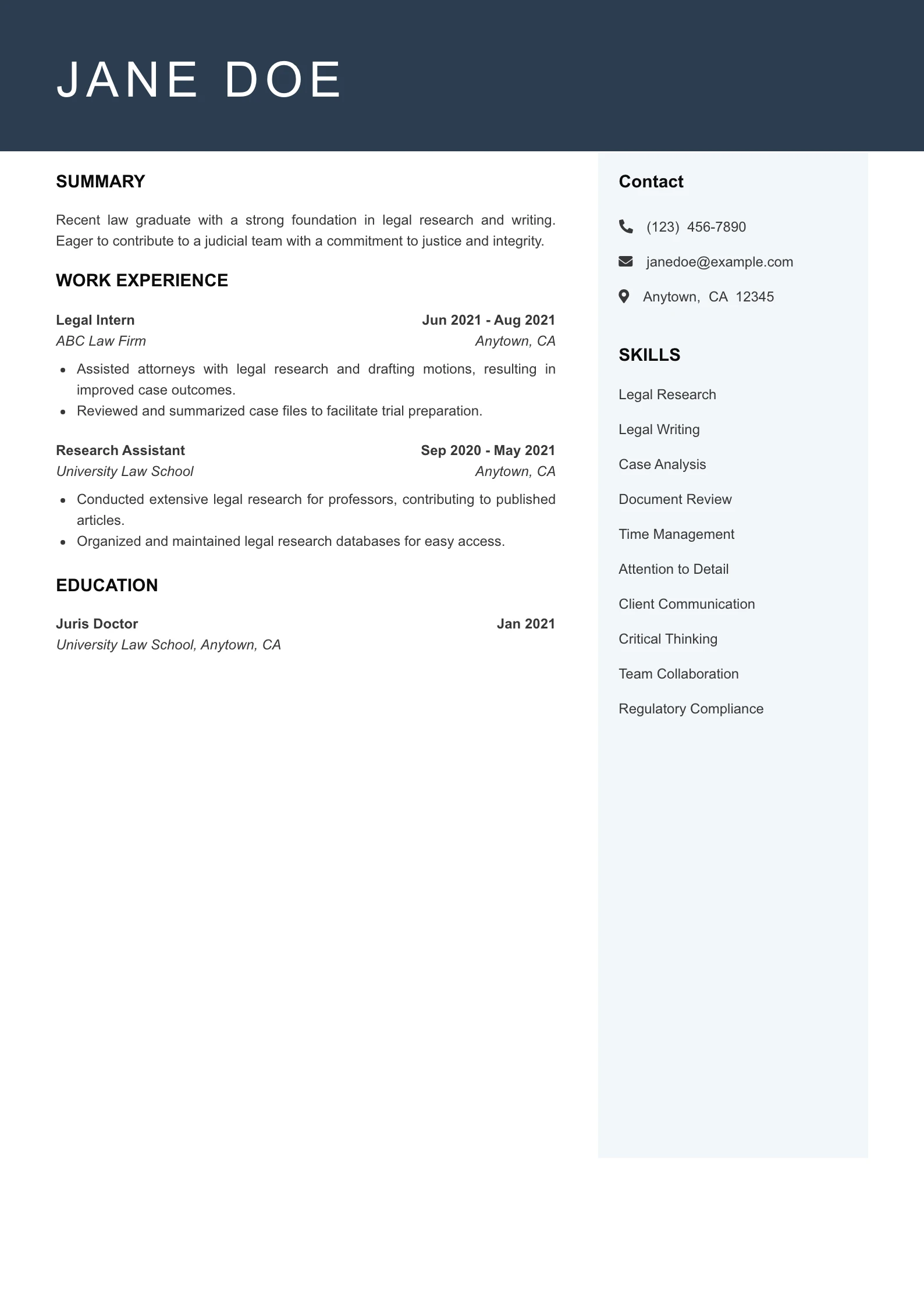
Why This Resume Works
- The summary clearly communicates Jane’s recent education and eagerness to contribute, aligning well with entry-level opportunities in the legal field.
- Relevant skills are highlighted effectively, showcasing both technical legal abilities and essential soft skills, making her a well-rounded candidate.
- The work history section emphasizes impactful contributions, such as improving case outcomes and supporting published research, which demonstrates her practical experience and value.
- The resume is tailored for an entry-level position, with appropriate experiences that reflect her qualifications as a recent law graduate seeking to start her career.
- Clarity and tone are professional and concise, making the resume easy to read and ensuring that key information stands out to hiring managers.
Mid Level Judicial Law Clerk Resume Example
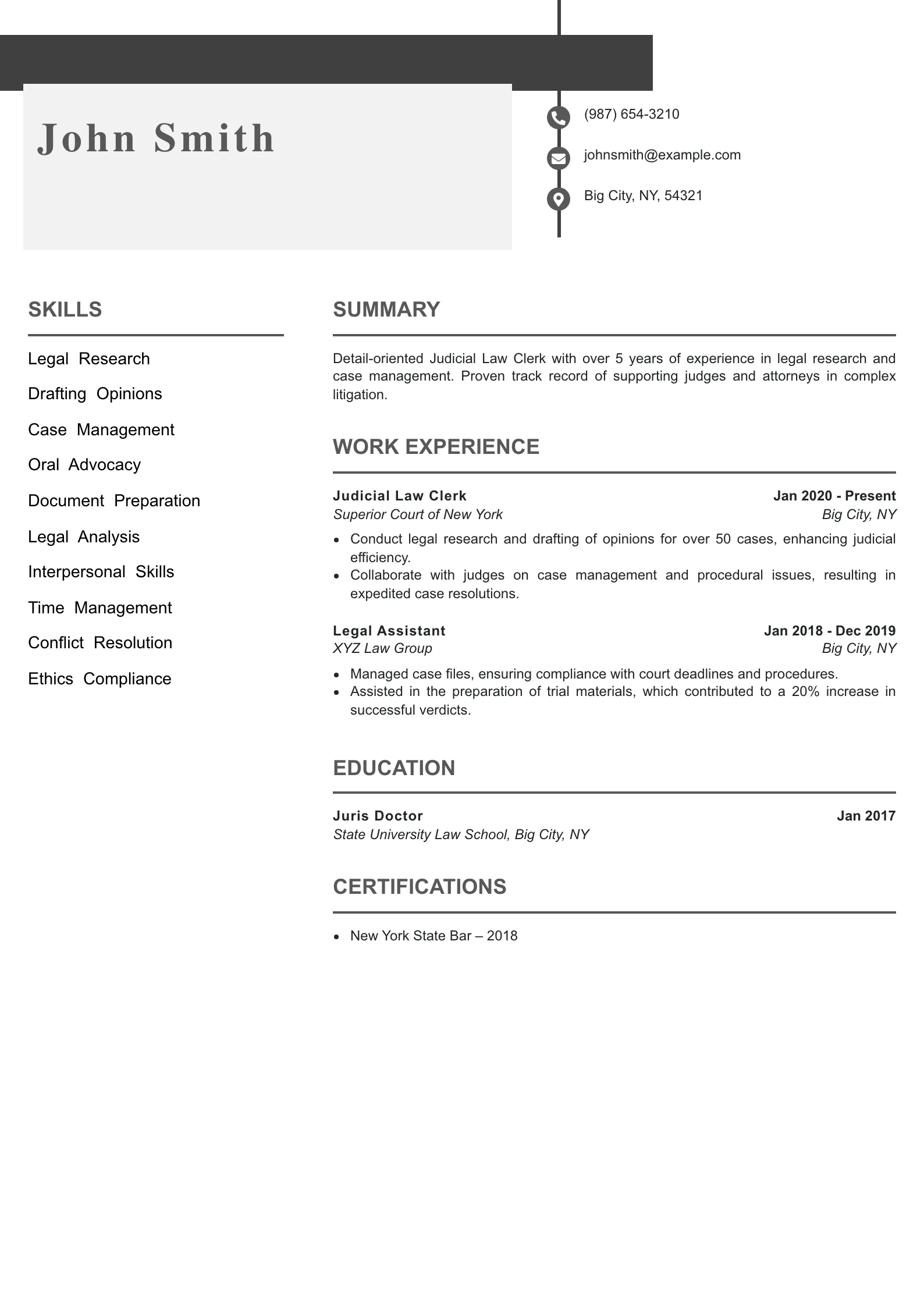
Why This Resume Works
- The summary provides a clear and concise overview of John Smith’s experience, positioning him as a detail-oriented professional with significant expertise in legal research and case management, which aligns well with the legal field.
- Relevant skills are prominently listed, showcasing a well-rounded legal background that includes both technical abilities (like legal research and drafting opinions) and interpersonal skills (such as conflict resolution), making him a strong candidate for law-related roles.
- The work history highlights impactful contributions, such as enhancing judicial efficiency and increasing successful verdicts, which demonstrates John’s ability to deliver measurable results in his roles.
- The resume reflects an appropriate level of experience for a mid-level professional, with over 5 years of relevant experience and progressive responsibilities that indicate readiness for more advanced roles.
- The clarity and professional tone of the resume make it easy to read and understand, ensuring that key information is communicated effectively, which is essential for capturing the attention of hiring managers.
Senior Level Judicial Law Clerk Resume Example
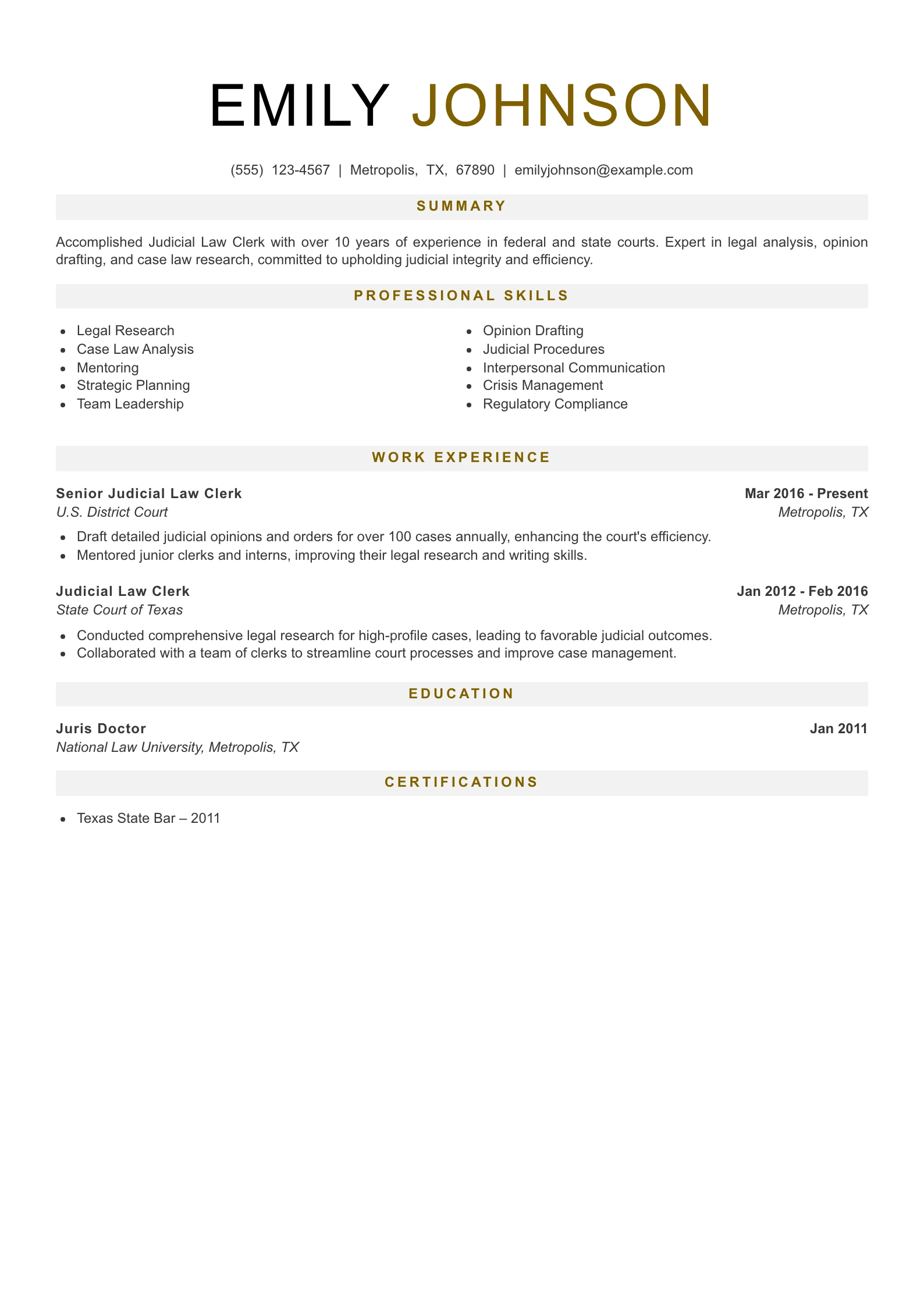
Why This Resume Works
- The summary clearly highlights Emily’s extensive experience and expertise in the legal field, establishing her qualifications effectively for potential employers.
- The skills section showcases a mix of both technical legal skills and soft skills, emphasizing her comprehensive capabilities relevant to her role and potential future positions.
- The work history details impactful contributions, such as drafting judicial opinions for a significant number of cases and mentoring junior staff, demonstrating her leadership and influence within the judicial system.
- The resume aligns well with a senior-level position, as it reflects a strong track record of responsibilities and achievements that indicate readiness for higher-level roles.
- The clarity and professional tone throughout the resume convey a sense of competence and professionalism, making it easy for hiring managers to assess her qualifications quickly.
How to Craft a Strong Judicial Law Clerk Resume
Creating a powerful resume is crucial for a Judicial Law Clerk position, as it serves as your first impression to hiring managers. A well-organized and tailored resume can showcase your legal expertise, attention to detail, and analytical skills—qualities that are essential for success in this role. This guide will help you effectively highlight your strengths and align your experiences with what employers are looking for.
1. Summary Statement
A strong summary statement is essential for a Judicial Law Clerk as it provides a snapshot of your qualifications and intentions. This brief introduction should encapsulate your experience level, areas of specialization, essential soft skills, and any relevant certifications. Hiring managers look for concise yet impactful summaries that set the tone for the rest of your resume.
When crafting your summary, aim for a confident and tailored approach that focuses on results. Highlight what makes you unique and how your background aligns with the needs of the court or legal office you are applying to.
Instead of writing examples directly here, see below for examples of a strong Judicial Law Clerk summary:
Motivated recent law graduate with a passion for legal research and writing, seeking to leverage skills in legal analysis to support judicial operations.
Mid-Level:
Experienced Judicial Law Clerk with over 3 years of assisting judges in case preparation and legal research, dedicated to delivering thorough and precise legal documents.
2. Skills & Qualifications
For a Judicial Law Clerk, it’s vital to emphasize both core legal skills and essential soft skills. Core skills may include legal research, writing, and analysis, while soft skills could cover communication, time management, and critical thinking.
To pinpoint the right skills for your resume, carefully review job descriptions and consider Applicant Tracking System (ATS) requirements. This will help ensure that your listed skills resonate with what hiring managers value and that they’re tailored to the specific position.
Refer to the list below for examples of effective skills to include:
- Legal research
- Case analysis
- Drafting legal memoranda
- Attention to detail
- Oral and written communication
- Time management
- Critical thinking
- Knowledge of legal software
Top ATS Keywords for Judicial Law Clerk
3. Work History
When detailing your work history, focus on quantifiable achievements and relevant experiences. Highlight specific cases or projects where you demonstrated patient care, metrics achieved, leadership roles, or specialized procedures.
Adopt a reverse-chronological format to clearly outline your professional journey, and use quantified bullet points to convey your contributions. This structure helps draw attention to your most relevant achievements and makes your resume easier to skim.
For an illustrative work history section, refer to the following:
Legal Intern, Smith & Associates, New York, NY, May 2022 – Aug 2022
– Conducted legal research and drafted memos for ongoing cases
– Assisted in preparing trial documents and exhibits
– Collaborated with attorneys on case strategies
Mid-Level:
Judicial Law Clerk, Hon. Jane Doe, U.S. District Court, Boston, MA, Jan 2020 – Present
– Managed case files and prepared summaries for court proceedings
– Conducted in-depth legal research on complex issues
– Drafted opinions and orders for the judge’s review
4. Education
A strong educational background is crucial for a Judicial Law Clerk. Typically, candidates will have a Juris Doctor (JD) degree from an accredited law school. Include your degree, school name, and graduation year in a clear format.
Ensure that you present any relevant certifications or honors received during your education, as these can set you apart from other candidates.
For formatting guidance, see below:
Juris Doctor, School Name, City, State, Graduation Year
Example:
Juris Doctor, Harvard Law School, Cambridge, MA, 2019
5. Additional Sections
Including additional sections in your resume can enhance your candidacy. Consider adding sections for Certifications, Languages, Awards, or Volunteer Work. These elements can highlight your commitment to professional development and community service.
For example, you might include certifications such as “Certified Paralegal” or “Legal Research Certification.” A clear format for certification listings is crucial.
For examples of how to structure these additional sections, check below:
- Certified Legal Assistant (CLA) – National Association of Legal Assistants – 2021
- Advanced Legal Research Certification – 2022
6. Do’s and Don’ts
Here’s a practical list of do’s and don’ts for crafting an effective Judicial Law Clerk resume:
Do:
- Tailor your resume for ATS compatibility.
- Showcase your impact and contributions.
- Use industry-specific terminology.
Don’t:
- Use generic statements that don’t reflect your experience.
- Ignore the importance of soft skills.
- Overuse buzzwords without providing context.